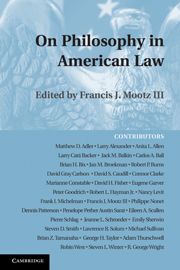Book contents
- Frontmatter
- Contents
- Introduction
- PART I KARL LLEWELLYN AND THE COURSE OF PHILOSOPHY IN AMERICAN LAW
- PART II PHILOSOPHICAL PERSPECTIVES ON LAW
- PART III AREAS OF PHILOSOPHY AND THEIR RELATIONSHIP TO LAW
- PART IV PHILOSOPHICAL EXAMINATIONS OF LEGAL ISSUES
- PART V LAW, RHETORIC, AND PRACTICE THEORY
- 23 Foundationalism and Ground Truth in American Legal Philosophy: Classical Rhetoric, Realism, and Pragmatism
- 24 The Irrelevance of Contemporary Academic Philosophy for Law: Recovering the Rhetorical Tradition
- 25 Dicta
- 26 Recent and Future Concepts of Law: From Conceptual Analysis to a Practice Theory of Law
- 27 The Tasks of a Philosophy of Law
- PART VI QUESTIONING THE RELATIONSHIP BETWEEN PHILOSOPHY AND AMERICAN LAW
- PART VII COMMENTARIES
- Contributors and Selected Bibliography
- Name Index
- References
26 - Recent and Future Concepts of Law: From Conceptual Analysis to a Practice Theory of Law
Published online by Cambridge University Press: 31 July 2009
- Frontmatter
- Contents
- Introduction
- PART I KARL LLEWELLYN AND THE COURSE OF PHILOSOPHY IN AMERICAN LAW
- PART II PHILOSOPHICAL PERSPECTIVES ON LAW
- PART III AREAS OF PHILOSOPHY AND THEIR RELATIONSHIP TO LAW
- PART IV PHILOSOPHICAL EXAMINATIONS OF LEGAL ISSUES
- PART V LAW, RHETORIC, AND PRACTICE THEORY
- 23 Foundationalism and Ground Truth in American Legal Philosophy: Classical Rhetoric, Realism, and Pragmatism
- 24 The Irrelevance of Contemporary Academic Philosophy for Law: Recovering the Rhetorical Tradition
- 25 Dicta
- 26 Recent and Future Concepts of Law: From Conceptual Analysis to a Practice Theory of Law
- 27 The Tasks of a Philosophy of Law
- PART VI QUESTIONING THE RELATIONSHIP BETWEEN PHILOSOPHY AND AMERICAN LAW
- PART VII COMMENTARIES
- Contributors and Selected Bibliography
- Name Index
- References
Summary
General jurisprudence is the study of the most general features of law. The tradition of analytic jurisprudence – one that spans from Hobbes to Coleman – has exhibited a sustained focus on identifying the constitutive features of law. For some time, this question has been framed as the search for the essential or necessary features of the concept of law. But a look at the tradition reveals that this is only one of a number of ways of looking at law from a similar vantage point. That vantage point or perspective focuses on the structure of law. For a variety of reasons, this focus is changing and a new question is emerging.
This essay is written at a time when the field of analytic jurisprudence is in a state of flux. For the past several decades, debate has centered on evaluating and responding to Ronald Dworkin's critiques of positivism. While there are (and no doubt will continue to be) philosophers with an interest in these questions, discussion in the field is moving to other topics. One of these topics is the focus of this essay.
Stated in general terms, my interest lies in explicating the idea of law as a certain sort of practice. The idea of law as a practice is intuitively obvious. Law is an iterative enterprise in which practitioners make claims over time in forms that repeat themselves, albeit in sometimes unfamiliar ways.
- Type
- Chapter
- Information
- On Philosophy in American Law , pp. 223 - 231Publisher: Cambridge University PressPrint publication year: 2009



